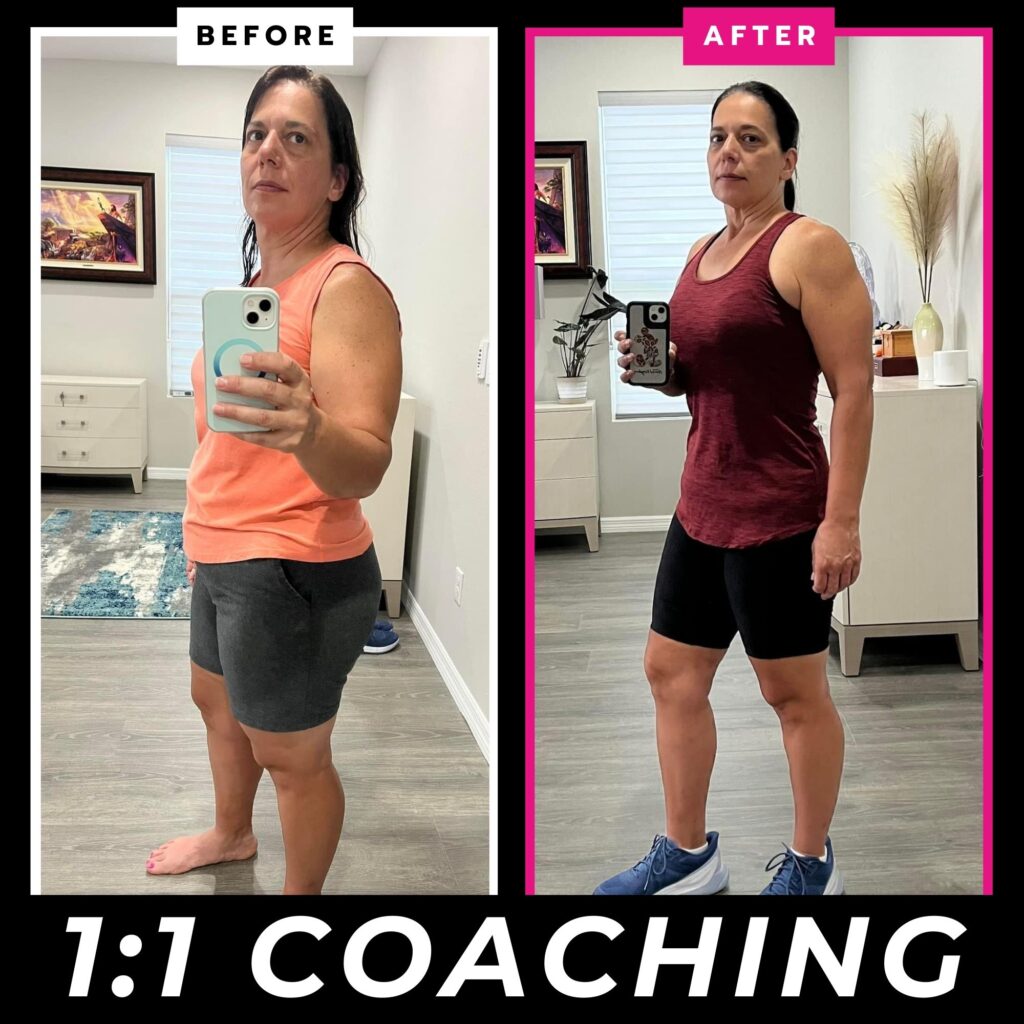Getting older means often what used to work no longer does.
And especially with the hormonal changes of menopause, you can’t just keep training and eating the way you always have.
Frustrating?
Sure.
But we’ve got to face reality.
And the more we embrace this and the faster we adjust, the more we realize how many symptoms of menopause are actually within our power to control.
Now if you’re thinking…
But I train so hard…
I eat so clean…
That doesn’t mean you don’t have some boosters and disruptors in your diet that need to be addressed if you want to look, feel and move your best.

Yup.
Look, feel and move like your most fabulous fit self…
Because adjusting our diet isn’t just about fitting back into those slacks that have been hanging in our closet gathering dust because that top button just won’t close…
Nope!
Nutritional changes don’t just have an impact on weight loss or muscle gains…
Addressing those boosters and disruptors in our diet can help alleviate those hot flashes that make you want to stick your head in a bucket of ice…
…Or the aches and pains that make you feel like you’re a 1000 years old just getting up off the couch…
…Or the fatigue you feel that makes you feel like a zombie that could power through two family sized bags of candy in one sitting and still go back to sleep…
Our nutrition, and the adjustments we make can have a huge impact.
Which is why I remind clients, you can’t stop menopause…
But you CAN focus on controlling what you can control…and how you fuel is just one of those things you have so much power over!
So let me go over what boosters and disruptors are before I cover some common foods and lifestyle habits in each category.
I’ll then give you tips to help make adjustments to find your balance!
WHAT ARE BOOSTERS AND DISRUPTORS?
The foods we consume can have either a positive or negative impact on the results we get and how we feel.
This isn’t as simple as clean or dirty, healthy or unhealthy.
Because you may find that you develop intolerances to healthy foods you used to include.
Like this sparkling water you used to drink and enjoy now leads to excess gas and bloating during menopause because of the changes to our GI system that can occur.
This doesn’t mean we just have to eliminate all of the things we love, BUT it is why we need to be aware of what may be a booster or disruptor to be able to balance everything out.
Boosters are foods and behaviors that can help improve the symptoms of menopause.
Disruptors on the other hand are foods and behaviors that can exacerbate menopausal symptoms and have a negative effect on overall health.
During menopause, you have to think of this scale as automatically skewed toward the disruptor side. Our hormones aren’t working for us like they did when we were younger.
When we’re younger, we can get away with a ton of improper practices. Of course these are part of why we tend to struggle to see results as we get older…
But the point is…they work at the time.
A weeklong Summer vacation filled with pina coladas, margaritas, chips and all the BBQ we can find could be counteracted with an extra gym session or two the next week.
But now…
Well now you look at a cookie and your pants no longer close.
It seems like we have to work three times as hard to see worse results.
And this is why paying attention to our booster-disruptor balance is so key.
So the more we can focus on boosters in our diet, the more we counteract the inflammation, brain fog and insulin resistance we may have found appear with menopause.
Now the more disruptors we have in our diet, the worse those symptoms become and the more we even knock the scale completely out of balance.
Of course your brain probably right now is automatically jumping to a ton of foods you know aren’t the best for you…
And you’re thinking, “BUT…I don’t want to cut out these things! I love them!”
Just because something is a booster, doesn’t mean it needs to be included. Just like just because something is a disruptor doesn’t mean we have to avoid it.
We may find specific foods have more or less of an impact.
And the dose makes the “poison” so to speak.
You may find that your cup of morning coffee doesn’t interrupt your sleep, but a sip more of caffeine after 10 am and you’re up up all night.
The key is finding our balance through small additions of boosters and elimination or reduction in those disruptors.
Ok so now I want to share some fundamental boosters and disruptors that I feel have the biggest, farthest reaching impact not only on how we feel but also how we look while being the overall easiest changes to make to our diet.
When it comes to the most powerful boosters these things are those unsexy, boring basics…
So stop avoiding them searching for a magic food that will cure all your problems.
If there was one, trust me I’d be happy to share it.
But these boosters are protein, water and omega-3s.
You may be groaning to yourself thinking, “Ugh. I know I should increase my protein and water but it’s sooooo freaking hard!”
Well let me let you in on the easiest way to create these habits…
Start by stacking small changes…
Like even just making sure you’re getting 20 grams of protein at breakfast or in your first meal of the day. Find one small change that is not only closer to what you’re doing currently but also something you can do EARLY ON in your day.
Because when something isn’t a priority, we aren’t going to do it the more worn out we get. The more other priorities press on us.
So if you aren’t finding yourself prioritizing protein, start by adding just a little bit more to that very first meal of your day!
Because increasing protein is one of the BEST things we can do for ourselves to feel our most fabulous in menopause.
During menopause, and as we get older, we are less able to utilize protein as efficiently. But protein keeps all of the tissues of our body, including our brain, health and strong!
So we need more if we want to function optimally and even look and feel younger!
By increasing our protein portion at each meal, we can create that optimal environment for muscle growth…mimicking what we naturally had when we were younger and didn’t even give protein a thought.
This muscle mass retention and even growth helps us stay functionally more fit to conquer any challenges that come our way while also being metabolically magical.
It can help us lose that stubborn fat that our body seems to believe it needs to not sink during menopause…like a floaty around our middle in the deep end.
Protein also improves our bone health, recovery and even our hormonal balance. Yup…it directly fights against those hormones going haywire!
It can be especially key to help regulate insulin. During menopause we can become more likely to develop insulin resistance and even type 2 diabetes.
A focus on protein helps us reduce our risk and even balance our blood sugar levels to manage mood swings and improve our energy levels.
So even if you don’t care about rocking that tank to say “suns out guns out,” you need to be increasing your protein to feel extra fabulous.
And as you increase your protein, you’ll want to stack on the habit of increasing your water.
Maybe you even set that water bottle out by the coffee machine to drink your water as you brew your coffee and prep your protein rich breakfast!
Because not only does water help with the digestion of protein and assist in better fat loss (it plays a key role in the lipolysis process!)
But as we go through menopause we may notice that we become drier…
Our joints become creekier and we may feel like the tinman…
And our skin and eyes may sometimes feel like all of the moisture was just sucked out of them the second after our last sip of water.
Improper hydration can hinder our recovery and well…make us look older and more wrinkled…which is actually the opposite of what most of us want…
Most of us feel like extra wrinkles are really only cute on those adorable little dogs!
Now you may be thinking “But I don’t FEEL thirsty ever! So how can my hydration be the problem?”
This weird phenomenon is due to the fact that as we get older we lose our bodies’ natural thirst cues.
So you may not feel thirsty, you may be drinking a decent amount of water and still need MORE currently!
And then as you increase your water and protein, don’t fear fats.
Fats do not make you fat, and increase your fat intake, specifically your Omega-3 intake may not only help you look leaner, look leaner but also keep your heart, brain and skin healthier as you go through menopause.
Getting more omega-3s can help reduce the increased inflammation that often occurs with menopause and negatively impacts our sleep, recovery and even muscle gains.
So increasing our omega-3 intake can improve our recovery and joint health, not to mention there have even been some recent interesting studies showing that omega-3s may lead to better strength and muscle building results from our training.
So consider including even an omega-3 source stacked in that breakfast, maybe in the form of smoked salmon on your eggs or even chia seeds in your antioxidant rich, berry packed smoothie (with some greek yogurt for that protein boost!)!
You may find even just stacking in these 3 boosters starts to positively impact your symptoms.
But if you’re making these changes and feel like you can still see more improvements, you may want to address some disruptors in your lifestyle as well…
If you’re getting nervous that I’m about to shame you and tell you to cut out all of the things you love…you’d be wrong.
While two of these disruptors will come as no surprise, you don’t have to eliminate them.
And probably jumping right to eliminating them completely will only backfire.
Instead, decide to maybe reduce your intake by a serving. Or eliminate the easiest one first.
Or even just set an experiment for yourself to remove them for 14-21 days and see how you feel. If it helps and feels worth it, great!
If not, slowly introduce them and see at what dose they go from ok to poison!
So first on the disruptor list…DUN DUN DUUUUUN
Is alcohol.
You know that nightly glass of wine that you feel makes you sleep better?
It doesn’t.
Alcohol has a negative impact on our sleep, recovery, fat loss, muscle gains, inflammation…
Yes even your glass of wine you don’t really drink, but tell yourself you drink, for the antioxidants.
Alcohol is a toxin…at every age.
And it can have a bigger impact on our symptoms of menopause, even making night sweats worse.
Alcohol is its own macro and has a high thermic effect, which means it can raise our body temperature.
So if you’re really consistently drinking alcohol, even in moderation but seriously OVER the symptoms of menopause, this single disruptor can outweigh a ton of boosters.
Consider cutting out just one serving of alcohol from your week this next week!
Now this next disruptor may have even more loyal daily drinkers, and just as many connoisseurs….
Coffee or more specifically caffeine.
Caffeine is part of a viscous cycle…
Menopause leads to poopy sleep.
Poopy nights of sleep make us want coffee to function even more. Coffee and the caffeine we consume to function ends up making it harder for us to get that quality sleep. And around we go.
To break that vicious cycle, we may have to tell ousrelves to “Suck it up buttercup” and embrace one very horrible no good very bad day.
We may also not want to go cold turkey, but start by reducing our caffeine intake a serving at a time.
Or we may even first start by adjusting when we drink it, making sure we drink it only at the start of our day.
But being aware of this cycle, even if we didn’t feel that caffeine used to impact our sleep, can be key.
Again, our body is changing and what used to slide may no longer work.
I also want to mention the impact of caffeine because it is tempting to turn to pre-workouts and even fat burners as we not only struggle to feel motivated to do our workouts but become increasingly frustrated when our hard work in the gym doesn’t pay off.
Here we don’t even want to workout yet we’re making ourselves at times only to not see those results snowball!
But those fat burners and pre-workout drinks will not only make symptoms worse, they often backfire further.
So don’t dig yourself more of a hole you’re going to have to crawl out of. Stick with adjusting those macros and fueling well as you meet yourself where you’re at with your training.
Now this final disruptor isn’t anything unhealthy.
It’s actually something many of us not only enjoy but include for its metabolism boosting properties…
It’s spicy foods, like hot sauces!
Spicy foods, or foods with capsaicin, are something that can be added to our diets for extra flavor as we may be looking to lean down and boost our metabolism even that 1%.
And there is nothing wrong with including hot sauces BUT we do want to note that even these “little” things can make certain symptoms worse.
While this disruptor may not be something you eliminate, especially as you add a booster….
If you’re having horrible hot flashes that make you feel like you’re sweating worse than that meme all over social media…
You may want to recognize that those spicy dishes you love are only making things worse.
Track and see if symptoms flare up more after meals with spice.
If they do, you may cut back on the spice at least for a little bit, until the symptoms calm down.
The key is recognizing all of the boosters and disruptors you’re consuming to be able to adjust by adding where you can, and reducing where you need.
FINDING YOUR BALANCE:
Because it truly is all about finding YOUR balance.
Each of these boosters and disruptors will have a different weight for us.
So we may find that an addition of a big booster, or one that really addresses our deficiencies, has an impact to balance things out.
While we may find by adding a smaller booster as we reduce a disruptor creates the balance right for us.
So don’t just feel like you now can’t have things you love or have to overwhelm yourself with changes.
Start small and realize that you’re in control and can truly manage your menopausal experience to move and feel your best.
You are not doomed!
To learn more about your boosters and disruptors…



